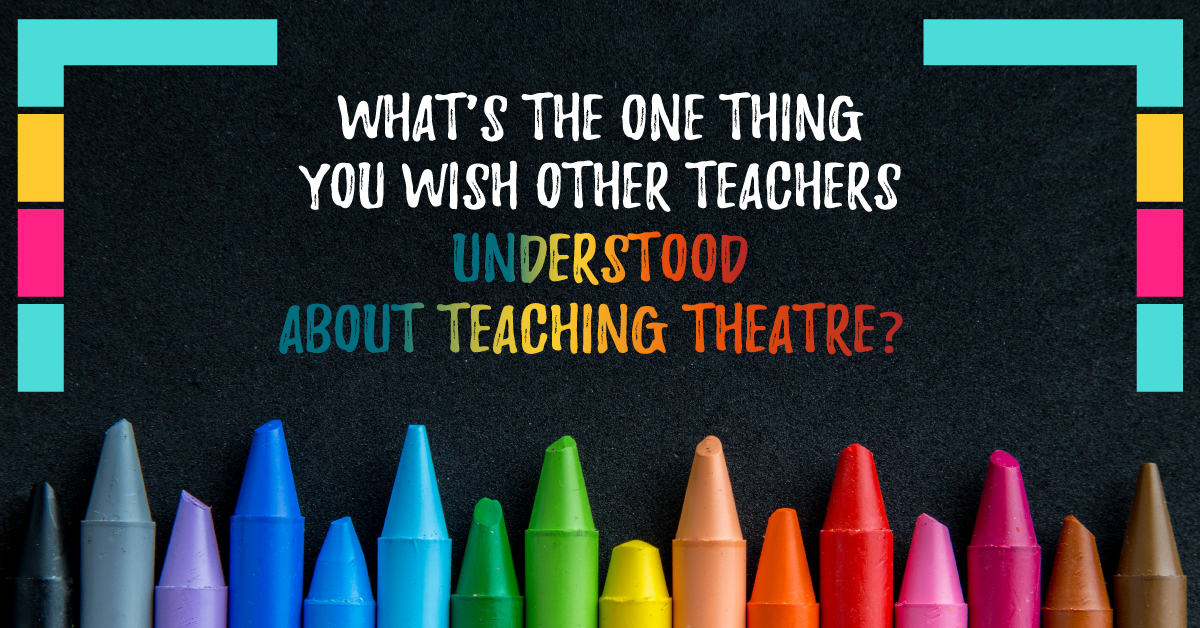Horror Movie 101: Failing Can Be Deadly by Steven Stack is a chilling mix of horror and humor - perfect for student performers and the spooky season! 👻
What's the One Thing You Wish Other Teachers Understood About Teaching Theatre?
Being a drama teacher is incredibly rewarding, but it’s also deeply misunderstood. From long rehearsal hours to teaching real academic content, theatre educators often find themselves having to justify the value of what they do.
Sound familiar? We went straight to the source to get the inside scoop from those who’ve been there: drama teachers.
We asked: What's the one thing you wish other teachers understood about teaching theatre?
Theatre Is Real Education
It’s a real class with real standards and objectives and benchmarks, just like math or English. We are doing real learning EVERY DAY, EVERY CLASS. (Chelsea P.)
I wish they understood I really teach content: theatre history, theatre conventions, plays, etc. We don’t just rehearse or practice in class. We have class. All the rehearsing and performing happens after school… after a day of teaching. (Kim M.)
It may look like I'm just "playing" with the kids but I promise, there's a lesson behind it for the kids to learn from. (Melanie PG.)
That we support core classes in more ways than they can count: literary analysis, measuring, study of historical time frames and cultures, adding fractions, creative writing, algebra, geometry… the list goes on and on. (Colleen M.)
Theatre Teaches Life Skills
The students aren’t just “learning lines to do a play,” they’re learning life skills to equip them for adulthood: time management (dropping scripts by a certain date), self-discipline (memorizing lines outside of rehearsals), teamwork (helping others to succeed), cooperation (learning to work with people you may not necessarily like), brainstorming (discovering your creative self and seeing the creativity in others), vocabulary, “reading a room” (playing to your audience, using your intuition), communication (doing a Q&A/talk back), public speaking. So, these theatre students are doing much more than “a play.” (Elizabeth M.)
I'm actually teaching them skills that make them employable. I'm teaching them how to work with a disparate group of people for a common goal. I'm teaching them how to communicate in real life, not on a computer. I'm teaching them how to speak and think on their feet. (Terri D.)
We do more differentiation in one class period than some teachers do in a year or a semester. (Devan W.)
The group might sound too loud, it may look like chaos, but it’s actually an ancient ritual taking place that has helped humans share ideas, bond, develop compassion, and realize the joys of publicly expressing “self” with each other for thousands of years. (Brenda C.)
Theatre Is Hard Work
How. Much. Work. Is. Involved. It’s a good thing that it’s fun! (Beth SG)
The time commitment and the workload. (Ritchie J.)
So many evening hours. (Elizabeth M.)
It takes time to write, format, rewrite, and market. (Pam MS.)
While it's the best "job" I've ever done, it's the most work and so time consuming. And yes, it can be tiring and hard work, long, long hours. (Kathleen O.)
How much work goes on behind the scenes. Not just the set building and costuming but keeping the trains running on time and avoiding the various pitfalls of working with students in an environment that rivals athletics! (Gina B.)
I taught high school drama classes, directed three major productions a year, took students to drama competitions on weekends, designed and taught students how to build scenery in my stagecraft classes, and did all the scheduling for our auditorium. And even though I was exhausted a lot of the time I loved every minute of my 33 years in education. (Mary B.)
I have one person for each role, and if they're gone for whatever reason (understudy on hand or not) it throws things way off. (Sabrina B.)
It doesn’t stop, the season. Once one show ends, I’m already knee deep into the other show or season. It’s year round! (Heather S.)
That it's not all improv games and an "easy A." I teach content. (Tamara M.)
Theatre Requires Sacrifice
I really WANT to be at your dinners, parties, and other events BUT rehearsals, set construction, and promoting the show have to happen while people are available. Unfortunately, that’s not always compatible with socializing with people outside of the production. (Julie R.)
Theatre Builds Deep Connections
Teaching theatre is more than a job. It’s an adventure. These are not just my students. They are my kids. We are a family. (Bil G.)
That it may seem silly to them, but will forever hold our hearts. The connections made through intense rehearsal and show periods are lasting ones and go deeper than just "work friends." (Danielle SP.)
Theatre Is for Everyone
To be a part of the theatre you don't need to be good at anything before you get here. You don't need to be athletic or read music or have innate talent. Just show up. There are plenty of possibilities for you to find your niche. (Sara V.)
Theatre is in everyone. (Suryadip M.)
There are usually more people behind the scenes than on stage. (Shannon M.)
Theatre Deserves Equal Respect
It's not a hobby. (Matt A.)
That my students matter as much as athletes. All our students matter. (Caity T.)
Additional Reading:
10 Reminders That What You’re Doing as a Drama Teacher Matters



